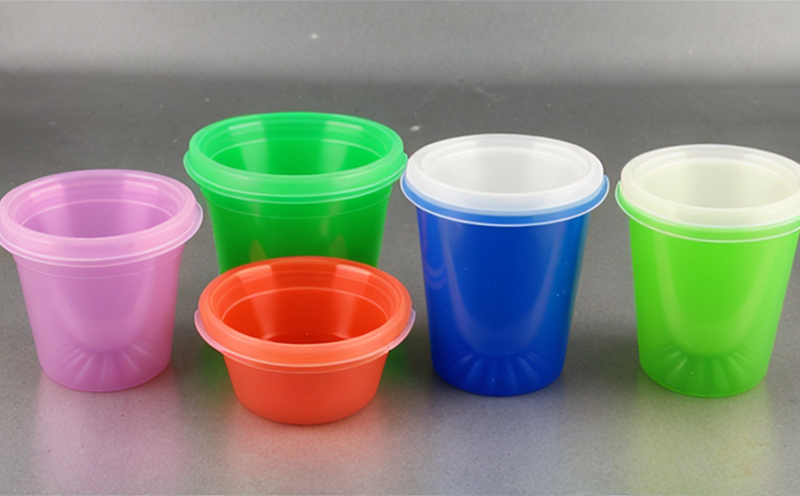JIS K 7219 Disposable Plastics Rheological Properties Testing
The JIS K 7219 test is a critical method for evaluating the rheological properties of disposable plastics, particularly those used in single-use applications. Rheological analysis helps determine how materials behave under various stress and strain conditions, which is essential for ensuring product performance, safety, and regulatory compliance.
This testing procedure is widely adopted by manufacturers to assess the flow characteristics and stability of plastic products during their lifecycle, from production to disposal. Understanding these properties allows for optimization of material composition, processing techniques, and end-of-life management strategies.
The JIS K 7219 standard focuses on measuring parameters such as viscosity, elasticity, and viscoelastic behavior using controlled shear stress or strain methods. These measurements are crucial in assessing the suitability of plastics for specific applications like medical disposables, packaging materials, and consumer goods.
For accurate testing, specimens must be prepared meticulously according to specified guidelines outlined in JIS K 7219. This typically involves cutting samples into standard dimensions suitable for rheological analysis equipment. The choice of specimen shape can influence the accuracy of results; therefore, adherence to these standards ensures consistent and reliable data.
The testing process itself requires sophisticated instrumentation capable of applying precise shear rates and temperatures while monitoring changes in viscosity over time. Various models of rheometers are available commercially, each designed to meet different experimental needs based on the type of plastic being tested.
After conducting experiments, laboratories generate detailed reports summarizing key findings including peak values for viscosity at various conditions as well as trends observed throughout the experiment. These insights provide valuable information not only about current product performance but also future development directions aimed at enhancing overall quality and sustainability.
The importance of this test cannot be overstated given its role in ensuring both technical excellence and environmental responsibility within the industry. By leveraging JIS K 7219 testing, companies can contribute positively towards reducing waste generation while simultaneously improving product functionality.
Scope and Methodology
| Parameter | Description | Measurement Technique |
|---|---|---|
| Viscosity | Measure resistance to flow at different temperatures. | Shear rate vs. temperature analysis using rheometer. |
| Elasticity | Determine the ability of the material to return to its original shape after deformation. | Dynamic mechanical analysis (DMA). |
| Viscoelastic Behavior | Analyze simultaneous elastic and viscous responses under applied stress or strain. | Torsional oscillatory shear testing. |
The methodology involves preparing standard specimens from the disposable plastic samples according to JIS K 7219 specifications. Specimens are then subjected to controlled temperature environments within rheometers equipped with appropriate fixtures for accurate measurement of physical properties.
Data collection includes continuous monitoring during heating or cooling cycles, capturing changes in viscosity and elasticity over time. Interpretation of results helps identify optimal processing temperatures and conditions that minimize degradation while maximizing product longevity.
Why Choose This Test
Selecting JIS K 7219 testing for evaluating disposable plastics offers several advantages:
- Accurate Assessment: Provides precise measurements of rheological properties critical to product performance.
- Regulatory Compliance: Ensures adherence to international standards, facilitating smoother market entry and compliance with regulations.
- Sustainability Focus: Supports efforts aimed at reducing environmental impact by providing data on material degradation rates post-use.
- Innovation Driver: Encourages continuous improvement through detailed understanding of material behavior under diverse conditions.
By choosing JIS K 7219 testing, stakeholders in the polymer and plastics sector can gain valuable insights that drive informed decision-making processes across various stages of product development lifecycle.
Environmental and Sustainability Contributions
- Material Optimization: Identifies optimal material properties for improved recyclability and reduced waste.
- Energy Efficiency: Helps in selecting materials that reduce energy consumption throughout their life cycle.
- Emission Reduction: Assists in identifying additives or processes that decrease greenhouse gas emissions during manufacturing and disposal phases.
- Water Conservation: Contributes to the development of products requiring less water during production, processing, and end-of-life recycling.
The data obtained from JIS K 7219 testing plays a pivotal role in advancing sustainable practices within the polymer and plastics industry. It enables manufacturers to make informed choices that balance economic efficiency with ecological responsibility.





